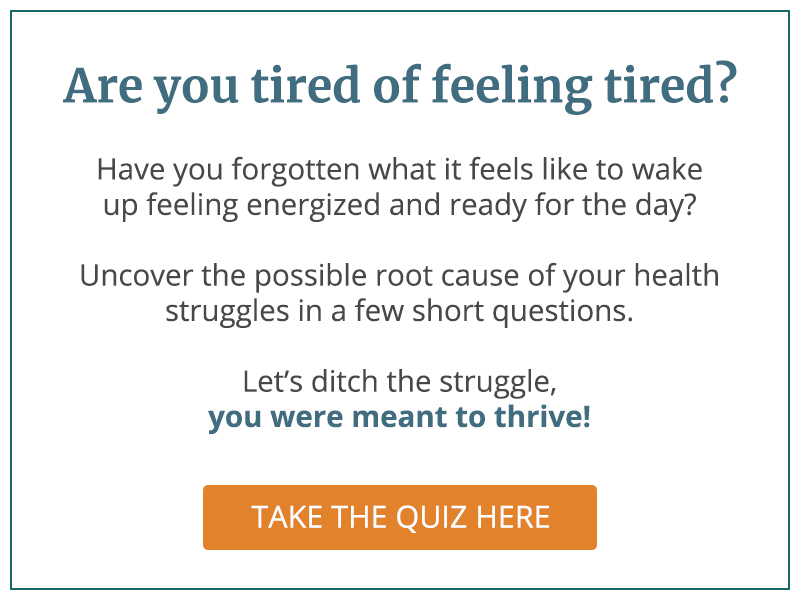Prioritizing your sleep is one of the most important things you can do to improve your health.
I know it’s not always the easiest thing to do, but when my patients begin to focus on getting enough sleep, I’ve seen their lives improve.
We live in a time where busyness and over-scheduling are just expected. Sleeping is almost regarded as a luxury. We’re celebrated when we stay up all night to study or get a big work project done.
To make matters worse, we’re constantly bombarded by artificial blue light, and stimulants like coffee are ingrained in our culture. It’s more socially acceptable to chug an energy drink from the gas station counter than it is to actually get the rest we need.
But sleep deprivation has its effects on our health in many ways.
In fact, recent studies show that researchers previously underestimated the effects that lack of sleep can have on cognition. Sleep deprivation triples lapses in attention and doubles place keeping errors.
And it’s not just our mental acuity that’s affected by lack of sleep.
Sleep deprivation can lead to:
Motor vehicle and workplace accidents are also more likely to occur if sleep deprivation is involved.
How To Get A Better Nights Sleep
So, we understand that sleep is important. But so often it seems we’re chasing that elusive good nights’ sleep.
Luckily, there are several, relatively easy things you can do to start improving the quality of your sleep tonight. And, if you’re looking for some light reading before bed, grab a copy of my best selling book, Built to Thrive.
Ideally, we want to get the highest quality, most restful sleep we possibly can while we’re in bed. Here are a few of my favorite ways to make sure you get the most of each Zzzzz.
1. Wake Up And Go To Bed At The Same Time Every Day
Yes, even on the weekends. Bedtimes aren’t just for children. Allowing your body to settle into a routine that’s congruent with your circadian rhythm does wonders for the quality of your sleep. When your body knows to expect that it’s time for bed and it’s time to wake up, sleep is more efficient. Which means you’ll wake up feeling better rested.
2. Don’t Eat Too Close To Bedtime
Our bodies aren’t great at performing more than one critical function at a time. So if we eat and then go straight to bed, our digestive system is still working when we’re trying to shut down and sleep. Again, a routine here is key. Keeping your dinner time consistent makes bedtime naturally flow as well. Limit your intake of fluids at night too, waking in the middle of the night with the urge to urinate is not ideal for quality rest.
3. Get Enough Exercise And Sunlight During The Day
Our bodies are sensitive to sunlight. If we stay inside all day, we don’t get the cues we need that signal proper sleep. Exercise also ensures that our body feels tired at night. When we’re physically active, the quality and duration of our sleep improves. That’s right, in addition to all the other amazing things physical activity does for your body, it also improves sleep. Extra bonus points if you exercise outdoors.
4. Don’t Bring Your Electronics Into The Bedroom
Scrolling through your Facebook feed before bed may seem like a relaxing activity, but it’s not ideal for the best sleep. Our phones are famous for emitting artificial blue light that interferes with your body’s natural circadian rhythm. The same goes for the digital alarm clocks and TVs that have a lighted power button. Even street lights outside your window can cause your sleep to not be as sound as it could be. Try blackout curtains and put a piece of electrical tape over any of those electronics with pesky buttons that won’t turn off.
5. Minimize Caffeine, Especially In The Afternoon
Caffeine isn’t necessarily bad for everyone at all times. But we consume far too much of it on a regular basis. A single serving of coffee is supposed to be 6 ounces. The smallest beverage size at your neighborhood coffee shop is typically 12 ounces. And with sodas, energy shots, and energy drinks available at all times throughout our day, most of us end up consuming way too much. If you drink that last energy drink in the afternoon, it can take hours to clear your system and still may be affecting your ability to fall asleep at night. If you’re going to indulge in caffeine, keep it reasonable and stick to morning joe only.
6. Cut Out The Alcohol
First I take away your coffee, and now I’m suggesting you skip alcohol too? Not to ruin everyone’s fun, but alcohol can have a negative impact on your sleep. Alcohol can interfere with melatonin levels and can cause disrupted sleep. So while you may consider indulging in a night time alcoholic beverage to wind down, ultimately, it’s going to make you sleep worse. Try something like a nice chamomile tea instead.
7. Keep Bedroom Temperature At An Ideal Range
Everyone’s temperature preferences are different, but typically keeping your bedroom a little cooler can help increase sleep quality. A temperature between 60-70 degrees usually makes for the most comfortable and deep sleep.
Optimize Your Sleep For Thriving Health
Hopefully, I’ve convinced you to start making that 7-9 hours each night a priority.
If you want to improve your health, you have to start with a firm foundation of a good night’s rest. Even if you can implement one of the strategies here to help improve your sleep quality, you’re farther ahead than most. Shoot for making one change a week, it’s much easier to stick with an improved routine when you implement changes one at a time.
If you’re curious about other changes you can make to jumpstart your health, I’d love to show you how my patients regularly improve the quality of their sleep, lose weight and gain a ton of energy by following my treatment plans.
Schedule a quick call with me HERE so we can talk about how I can best help you achieve your health goals.
References
“Science underestimated dangerous effects of sleep deprivation.” 21 Nov. 2019, https://www.sciencedaily.com/releases/2019/11/191121183923.htm.
“Sleep deprivation: Impact on cognitive ….”
https://www.ncbi.nlm.nih.gov/pmc/articles/PMC2656292/.
“About Sleep’s Role in Memory – NCBI.”
https://www.ncbi.nlm.nih.gov/pmc/articles/PMC3768102/.
“Sleep and obesity – NCBI – NIH.”
https://www.ncbi.nlm.nih.gov/pmc/articles/PMC3632337/.
“Does lack of sleep cause diabetes? | Cleveland … – MDedge.” https://www.mdedge.com/ccjm/article/95530/diabetes/does-lack-sleep-cause-diabetes.
“Sleep Duration as a Risk Factor for Cardiovascular … – NCBI.” https://www.ncbi.nlm.nih.gov/pmc/articles/PMC2845795/.
“HPA Axis and Sleep – Endotext – NCBI Bookshelf.” 18 Jan. 2016, https://www.ncbi.nlm.nih.gov/books/NBK279071/.
“Sleep deficiency and motor vehicle crash risk in … – NCBI – NIH.” 20 Mar. 2018, https://www.ncbi.nlm.nih.gov/pmc/articles/PMC5859531/.
“Evening alcohol suppresses salivary melatonin … – NCBI – NIH.” https://www.ncbi.nlm.nih.gov/pubmed/17612945.



